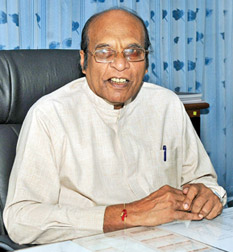Prisoners will be turned into productive citizens
By L.S. Ananda WEDAARACHCHI
|

Prisons Reforms Minister D.E.W. Gunasekera
|
Prison Reforms Minister D.E.W. Gunasekera said that the society
should look at the prisoners from a humanitarian angle. Convicted
persons are sentenced in the hope that they would be reformed at the
prison. We expect them to return to society as useful citizens, he said.
The Prison Reforms and Rehabilitation Ministry was established only
six months ago. The Sri Lanka Communist Party was one of the constituent
parties of the UPFA led by President Mahinda Rajapaksa. Communist Party
leader and veteran politician D.E.W. Gunasekera was appointed Minister
of Prison Reforms and Rehabilitation.
Excerpts from the interview:
Q: The police were severely attacked by the prisoners last
week when they went to the Welikada prison to conduct a search
operation. Your comments?
A: Welikada incident was blownup out of proportion. Reforms in
prisons are overdue. The Prison Department was established in 1844. Four
previous commissions had recommended reforms. No reforms were ever
implemented despite the recommendations made by the commissions.
Q: Could you outline the situation in prisons and the main
causes for that situation?
A: The prisons are largely over crowded. There are over 30000
convicted and remand prisoners in prisons where the space is available
only for 11000. The acute congestion and the drug menace have been
identified as the root cause of problems in prisons. Some drug kingpins
are undergoing prison terms. Over 148,740 prisoners were admitted to
prisons during 2009. Out of them 37,872 were those convicted of various
crimes while the majority 108,868 were remand prisoners. The daily
average of inmates in Welikada, Magazine and Colombo prisons was around
9000 in 2009, while the facilities are available only for less than one
third of them.
Q: Remand prisoners subjected of minor offences are victims of
this situation. Some of them have been arrested on fabricated charges.
Your comments?
A: Conditions under which the remand prisoners are housed are
deplorable. Some of them have been in the prison only for a day while
others are languishing for years until they are released on court
orders. Compared to remand prisoners, the convicted prisoners have a
work schedule and they enjoy better facilities. Remand prisoners are
forced to stand on for hours due to the lack of accommodation.
Q: Have you taken any steps to improve this situation? Had
there been a commission appointed to look into the prison conditions and
recommendations made?
A: Appointment of commissions is no solution to the problem.
Commissions will take years to hold its sittings and make
recommendations as we have experienced earlier. Interim committees were
appointed and recommendations were made to meet special situations.
Q: Were there any such recommendations implemented during the
last six months?
A: The Prison Reforms Ministry always worked with other
stakeholders such as Defence Ministry, Police Department and Justice
Ministry to implement the reforms recommended by the interim committees.
Establishing the community based Corrections Department was one of the
successful projects launched by my ministry under this scheme.
The suspects who can be sentenced for minor offences will be referred
to the community based Correction Department - CBC Dept - They will be
assigned community work only for a limited number of hours a day and
allowed to live with their families.
This scheme has been found to be very successful. Only ten percent
out of 18000 who were referred to the Correction Department in 2009 were
reconvicted on subsequent offences. Over 50 percent convicted prisoners
were reconvicted of offences committed after they are released from
prison.
The criminologists and sociologists are also attached to CBC Dept.
which is manned by retired judge Lalith Andrahannadi. It has been shown
remarkable progress in its correctional programme. It has helped inmates
behaviour and reduce the congestion in the prisons.
Q: What is the progress of the rehabilitation projects
undertaken by the ministry?
A: The Correction Department also aims at rehabilitating
convicts referred to the CBC Department. They were engaged in number of
development activities in Southern Province such as constructing
agricultural tanks in Walasmulla.
Under the scheme they are required to work for 50 to 350 hours per
week in community development prjects in their areas. Discussions are
being held with the Police Department to reduce the inflow of prisoners
to the remand prisons. Police should make alternative arrangements to
have suspects of fatal accidents and convicts of minor offences detained
elsewhere without sending them to prisons. They could be kept under
police supervision.
Q: Are there any plans to setup new prisons or rehabilitation
camps?
A: Five locations have been identified to establish
rehabilitation centres. The Pallekele, Weerawila and Taldena
rehabilitation centres will be used to accommodate drug addicts
numbering over 4000 who are at present in Walikada and Colombo prisons.
They are treated by a panel of doctors and specialists at the Pallekele,
Weeravila and Taldena rehabilitation centres. Grading and catagorising
of prisoners according to their offences and prison terms will be
implemented to reduce the acute congestion in prisons.
Q: Are there any scheme to relocate the Bogambara, Welikada
and Matara prisons?
A: A policy decision has been taken to shift prisons situated
in leading cities. The construction work of the Pallekele prison is
being completed. The Bogambara prison will be shifted early next year. A
suitable land has to be identified for the Welikada prison.
The convicted prisoners will be housed in prisons setup outside the
cities. Remand prisoners will be housed close to the courts. Those
measures will definitely solve the crisis situation in the prisons. |

